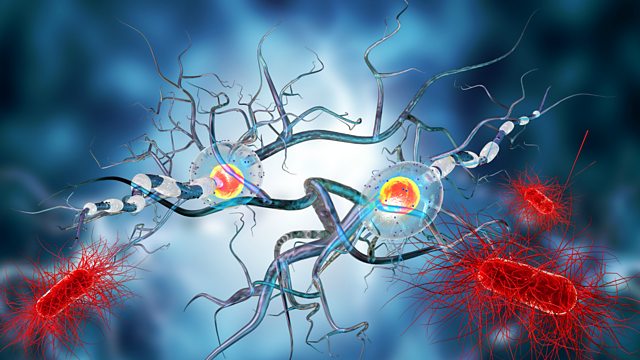
Huntington’s Disease
Huntington’s disease “breakthrough”; Coral devastation; Electric eels; California forest fires; Feeling shame at the doctors; Arthur C. Clarke
There’s been a breakthrough this week in the fatal brain condition, Huntington’s disease. Affected families are told they have a 50% chance of passing the faulty gene onto their children – and up until now there has been no treatment. Scientists at University College London corrected the genetic defect for the first time ever – using an experimental drug which was injected into the spinal fluid. Claudia Hammond talks to Roger Barker, Professor of Clinical Neuroscience at the University of Cambridge, one of the centres taking part in the study.
Climate change is seen as the number one threat to the future of coral reefs. This week the European Coral Reef Symposium in Oxford is discussing the problem. Adam Rutherford talks to Morgan Pratchett of James Cook University about the two recent coral bleaching events that hit the Great Barrier Reef, and to Barbara Brown of Newcastle University about the potential for coral species to adapt to warmer seas.
The electric eel is perhaps an obvious creature to turn to for inspiration for a power source. Researchers have examined the complex transfer of charged chemicals across the cell membranes in these eels to help them make an artificial electric organ. Experimental physicist Michael Mayer from the University of Fribourg in Switzerland speaks to Roland Pease.
Southern California is suffering intense forest fires right now, and October brought some of the largest forest fires since records began. What are the conditions that led to these disastrous events? Roland Pease asks forest ecologist Christina Restaino of University of California Davis.
Going to see the doctor can be embarrassing especially if you have to take off clothes or discuss a personal issue. The shame which can result from embarrassment can mean we don’t tell the doctor the whole story about our worries and this can affect our health. Claudia Hammond speaks to Dr Luna Dolezal, who has been researching shame at the doctor’s surgery.
Prolific science fiction writer, Arthur C. Clarke was born 100 years ago, on the 16th December 1917. Some think he was a man way ahead of his time as many of his predictions about future science and technology have come true. He is most famous for being co-writer of the book and screenplay for the 1968 film 2001: A Space Odyssey, widely considered to be one of the most influential movies of all time. Jack Meegan looks back on his life.
(Image caption: Illustration of nerve cells affected in neurological diseases - Credit: Getty Images)
The Science Hour was presented by Roland Pease with comments from ����ý Science reporter Bobbie Lakhera
Producer: Katy Takatsuki
Last on
More episodes
Previous
Next
Broadcast
- Sat 16 Dec 2017 12:06GMT����ý World Service Americas and the Caribbean
Podcast
-
![]()
Unexpected Elements
The news you know, the science you don't

